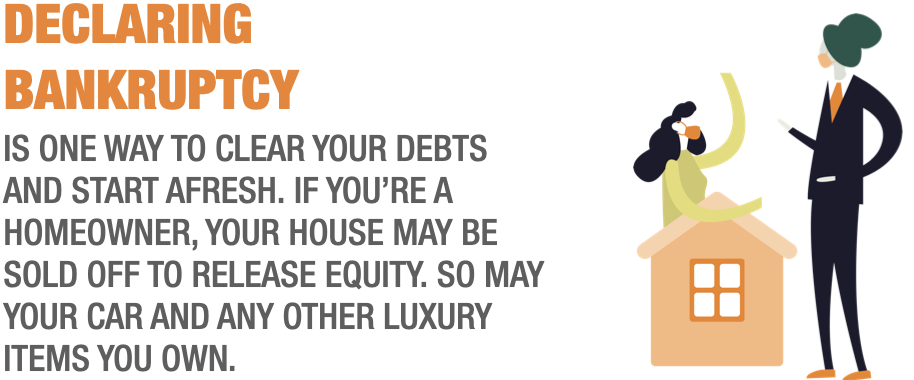
What is bankruptcy?
Bankruptcy is an insolvency option that writes off all debts you can prove you owe and allows you to make a fresh start. You need to think carefully about declaring yourself bankrupt as if you have any assets, they will be taken and used to pay off your debts.
How to apply for bankruptcy
If you are applying to become bankrupt, you must complete an online application and create an online account.
You’ll need to provide information about your:
- debts
- income
- outgoings.
Including any letters, you’ve received from bailiffs or enforcement agents.
Your application will be reviewed by an official adjudicator who works for the Insolvency Service. They’ll decide if you should be made bankrupt.
You usually get a decision within 28 days of submitting your application.
There are many ways to deal with debts and bankruptcy might not be the best solution for you.
You can find out more about how to apply for bankruptcy online on the GOV.UK website.
How much does it cost to go bankrupt?
It costs £680 to apply for bankruptcy and you will need to pay this before you submit your application.
If you can’t afford the fee you might be able to pay in instalments, to find out more about this, contact the insolvency enquiry line.
Remember to talk to a free Debt Advisor before you pay the fee to make sure that bankruptcy is the best solution for you.
What happens after I go bankrupt?
After you go bankrupt, an Official Receiver will be appointed within two weeks of receiving your bankruptcy order.
They will assess your:
- income
- assets, and
- outgoings.
In order to decide how they can be used to meet your debts.
You might also be asked to attend an interview with the official receiver.
Your creditors have to make a formal claim to the trustee for the money they are owed.
You can’t make direct payments to them and they can’t ask you for payments.
After a period of time (usually one year), most of your outstanding debts are written off and you can make a fresh start.
Until you are discharged from bankruptcy you will remain under bankruptcy restrictions. For example, you won’t be able to apply for credit of £500 or more without telling the lender about the bankruptcy.
You can check your discharge date online using the Individual Insolvency Register.
Any credit you do get is likely to be expensive both now and in the future.
Bankruptcy affects your credit rating and credit reference agencies will keep your details on file for a minimum of six years.
Who is bankruptcy suitable for?
If you have no real way of paying off your debts and few assets, then bankruptcy could be a suitable option.
If you are a homeowner it’s worth looking at other options because bankruptcy puts your home at risk of being sold if there is enough equity in it.
If you’re a tenant, your landlord can apply to evict you legally if you have fallen into rent arrears.
It’s really important you don’t make a decision to go bankrupt alone. Talk to a free Debt Advisor first.
Can I be made bankrupt?
The minimum level of debt for which someone who you owe money to can force you into bankruptcy is £5,000.
The process of being made bankrupt is different.
However, high street lenders rarely use this option and will prefer to work with you to find another way to pay off your debts.
You can find out more about what happens if someone does try to make you bankrupt on the GOV.UK website.
